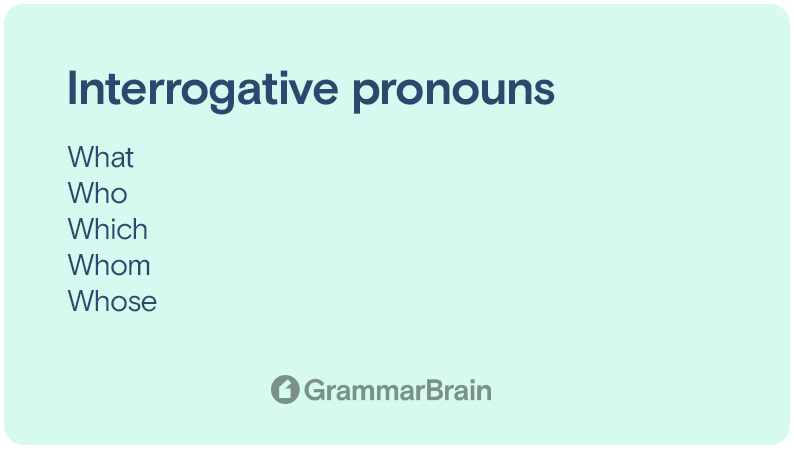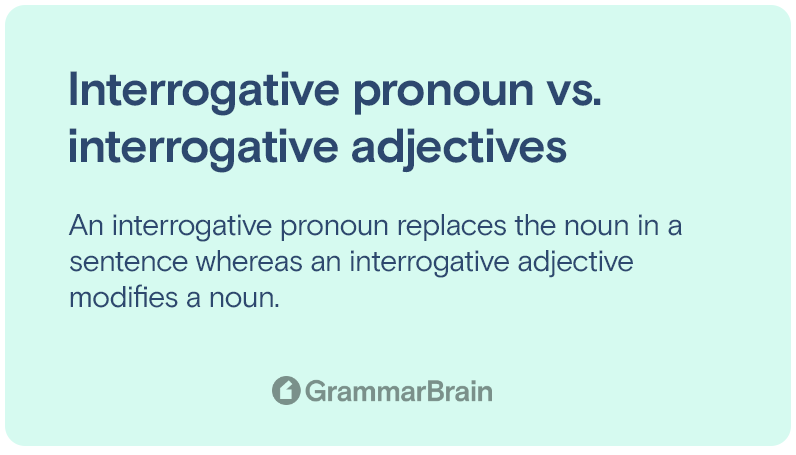Interrogative pronouns are one among the different types of pronouns in English grammar which help in framing questions. These are used in asking specific questions about something or someone. When constructing questions, these are usually the first words in the sentences.
What is an interrogative pronoun?
An interrogative pronoun is used to ask a question. For example, “who” is an interrogative pronoun. In the sentence, “Who are you going with tonight?” The “who” pronoun helps us to decipher the person in question.
An interrogative word or question word is a function word used to ask a question, such as what, which, when, where, who, whom, whose, why, whether and how.
Five interrogative pronouns and their examples

What
This type of interrogative pronoun is used to ask questions whose answer would be a thing or people.
Examples:
- What is your sister’s name? Here, the answer is a person’s name.
- What will you have for lunch? In this example, the answer is an object name like sandwiches or burgers.
- What do you like? Chips or Biscuits? This example refers to the objects’ chips or biscuits.
- What are you holding in your hand? The sentence refers to a thing.
- “What is your name?” In this example, “What” is the interrogative pronoun and refers to a person’s name in the example.
Who
The “who” interrogative pronoun is used to talk about a person or group of people.
Examples:
- Who addressed the gathering? In this example, the expected answer would be a person’s name.
- Who was driving the truck?
- Who ate my sandwich?
- Who are those standing next to the tree? The example refers to a group of people.
- Who are they sitting next to? Here, in this example, the “who” interrogative pronoun is referring to a person.
Which
The “which” interrogative pronoun discusses choices. Here are a few examples.
Examples:
- Which is your favorite book? Here the example asks for a selection from a group of books.
- Which is faster? Cheetah or Tiger? The example gives a choice between two animals.
- Which is costly? Pen or Pencil? The example gives a choice between two objects.
- Which are the best shoes? Adidas or Nike? The sentence gives a choice between two shoes.
- Which is the ideal place to visit? London or New York? The example gives a choice between two places.
Whom
“Whom” is rarely used in framing questions and when used, it talks about people.
Examples:
- Whom should I contact to get the passes for the game? In this example, the answer is the name of the person.
- Whom did you invite to lunch this afternoon?
- Whom did the government select for the highway project?
- Whom do I ask for my room keys in the hotel?
- Whom did you give my pair of jeans for washing? In this example, it is referring to a person who has the speaker’s pair of jeans.
Whose
This interrogative pronoun refers to a person possessing something.
Examples:
- Whose is this?
- Whose is this cup of tea?
- Whose is that shirt?
- Whose are these keys?
- Whose is this blue shirt hanging in the wardrobe?

What are the differences between interrogative pronouns and interrogative adjectives?
- An interrogative pronoun replaces the noun in a sentence whereas an interrogative adjective modifies a noun.
- Interrogative pronouns usually follow a verb whereas interrogative adjectives follow a noun. Knowing this makes it easy to identify interrogative pronouns and interrogative adjectives.
- An example of an interrogative pronoun is “Which is your favorite movie?”. Here, the interrogative pronoun “which” follows the verb “is”. On the other hand, “Which movie do you like?” is an example of an interrogative adjective. In this example, the interrogative adjective “which” follows the noun “movie”.
Another example of an interrogative pronoun is “whose is that?”. Here, “whose” follows the verb “is”. Another example of an interrogative adjective is “whose keys are these?”. In this example, the “whose” interrogative adjective follows the noun “keys”.
What are the differences between interrogative pronouns and interrogative adverbs?
- Interrogative adverbs are also used to frame questions but the answers to these questions typically end with an adverb like time, quantity, or place. On the other hand, interrogative pronouns are used to construct questions whose answers end up with a noun like persons, objects, or places.
- An example of an interrogative adverb is “When will you submit your assignment?”. In this example, the “when” interrogative adverb is used to ask about the time the person will submit the assignment. The answer could be immediately or as soon as possible. An example of an interrogative pronoun is “Who is he sitting next to?”. The expected answer to this example would be a person.
Another example of an interrogative adverb is “How many books do you have?”. It talks about quantity. Another example of an interrogative pronoun is “What is your name?”. This example talks about a person.
FAQs
Apart from the commonly used interrogative pronouns, the other ones are “Whatever”, “Whatsoever”, “Whichever”, “Whoever”, “Whosoever”, “Whomever”, “Whomsoever”, and “Whosever”. These pronouns are rarely used to form questions.
Why are interrogative pronouns used?
Interrogative pronouns are used to ask questions. These are used to talk about people or things/objects.
Sources
- What are Interrogative Pronouns?
- Interrogative Pronouns | Explanation and Examples
- Interrogative Pronouns
- What Is An Interrogative Pronoun?
- Difference Between Interrogative Pronoun And Interrogative Adjective
Inside this article
Fact checked:
Content is rigorously reviewed by a team of qualified and experienced fact checkers. Fact checkers review articles for factual accuracy, relevance, and timeliness. Learn more.
Core lessons
Glossary
- Abstract Noun
- Accusative Case
- Anecdote
- Antonym
- Active Sentence
- Adverb
- Adjective
- Allegory
- Alliteration
- Adjective Clause
- Adjective Phrase
- Ampersand
- Anastrophe
- Adverbial Clause
- Appositive Phrase
- Clause
- Compound Adjective
- Complex Sentence
- Compound Words
- Compound Predicate
- Common Noun
- Comparative Adjective
- Comparative and Superlative
- Compound Noun
- Compound Subject
- Compound Sentence
- Copular Verb
- Collective Noun
- Colloquialism
- Conciseness
- Consonance
- Conditional
- Concrete Noun
- Conjunction
- Conjugation
- Conditional Sentence
- Comma Splice
- Correlative Conjunction
- Coordinating Conjunction
- Coordinate Adjective
- Cumulative Adjective
- Dative Case
- Determiner
- Declarative Sentence
- Declarative Statement
- Direct Object Pronoun
- Direct Object
- Diction
- Diphthong
- Dangling Modifier
- Demonstrative Pronoun
- Demonstrative Adjective
- Direct Characterization
- Definite Article
- Doublespeak
- False Dilemma Fallacy
- Future Perfect Progressive
- Future Simple
- Future Perfect Continuous
- Future Perfect
- First Conditional
- Irregular Adjective
- Irregular Verb
- Imperative Sentence
- Indefinite Article
- Intransitive Verb
- Introductory Phrase
- Indefinite Pronoun
- Indirect Characterization
- Interrogative Sentence
- Intensive Pronoun
- Inanimate Object
- Indefinite Tense
- Infinitive Phrase
- Interjection
- Intensifier
- Infinitive
- Indicative Mood
- Participle
- Parallelism
- Prepositional Phrase
- Past Simple Tense
- Past Continuous Tense
- Past Perfect Tense
- Past Progressive Tense
- Present Simple Tense
- Present Perfect Tense
- Personal Pronoun
- Personification
- Persuasive Writing
- Parallel Structure
- Phrasal Verb
- Predicate Adjective
- Predicate Nominative
- Phonetic Language
- Plural Noun
- Punctuation
- Punctuation Marks
- Preposition
- Preposition of Place
- Parts of Speech
- Possessive Adjective
- Possessive Determiner
- Possessive Case
- Possessive Noun
- Proper Adjective
- Proper Noun
- Present Participle
- Prefix
- Predicate



